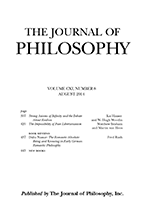Related Research Articles
Internalism and externalism are two opposite ways of integration of explaining various subjects in several areas of philosophy. These include human motivation, knowledge, justification, meaning, and truth. The distinction arises in many areas of debate with similar but distinct meanings. Internal–external distinction is a distinction used in philosophy to divide an ontology into two parts: an internal part concerning observation related to philosophy, and an external part concerning question related to philosophy.
Individualism is the moral stance, political philosophy, ideology and social outlook that emphasizes the intrinsic worth of the individual. Individualists promote realizing one's goals and desires, valuing independence and self-reliance, and advocating that the interests of the individual should gain precedence over the state or a social group, while opposing external interference upon one's own interests by society or institutions such as the government. Individualism makes the individual its focus, and so starts "with the fundamental premise that the human individual is of primary importance in the struggle for liberation".

The philosophy of perception is concerned with the nature of perceptual experience and the status of perceptual data, in particular how they relate to beliefs about, or knowledge of, the world. Any explicit account of perception requires a commitment to one of a variety of ontological or metaphysical views. Philosophers distinguish internalist accounts, which assume that perceptions of objects, and knowledge or beliefs about them, are aspects of an individual's mind, and externalist accounts, which state that they constitute real aspects of the world external to the individual. The position of naïve realism—the 'everyday' impression of physical objects constituting what is perceived—is to some extent contradicted by the occurrence of perceptual illusions and hallucinations and the relativity of perceptual experience as well as certain insights in science. Realist conceptions include phenomenalism and direct and indirect realism. Anti-realist conceptions include idealism and skepticism. Recent philosophical work have expanded on the philosophical features of perception by going beyond the single paradigm of vision.

Hilary Whitehall Putnam was an American philosopher, mathematician, computer scientist, and figure in analytic philosophy in the second half of the 20th century. He contributed to the studies of philosophy of mind, philosophy of language, philosophy of mathematics, and philosophy of science. Outside philosophy, Putnam contributed to mathematics and computer science. Together with Martin Davis he developed the Davis–Putnam algorithm for the Boolean satisfiability problem and he helped demonstrate the unsolvability of Hilbert's tenth problem.

Pragmatism is a philosophical tradition that views language and thought as tools for prediction, problem solving, and action, rather than describing, representing, or mirroring reality. Pragmatists contend that most philosophical topics—such as the nature of knowledge, language, concepts, meaning, belief, and science—are all best viewed in terms of their practical uses and successes.

Twin Earth is a thought experiment proposed by philosopher Hilary Putnam in his papers "Meaning and Reference" (1973) and "The Meaning of 'Meaning'" (1975). It is meant to serve as an illustration of his argument for semantic externalism, or the view that the meanings of words are not purely psychological. The Twin Earth thought experiment was one of three examples that Putnam offered in support of semantic externalism, the other two being what he called the Aluminum-Molybdenum case and the Beech-Elm case. Since the publication of these cases, numerous variations on the thought experiment have been proposed by philosophers.
Intentionality is the power of minds to be about something: to represent or to stand for things, properties and states of affairs. Intentionality is primarily ascribed to mental states, like perceptions, beliefs or desires, which is why it has been regarded as the characteristic mark of the mental by many philosophers. A central issue for theories of intentionality has been the problem of intentional inexistence: to determine the ontological status of the entities which are the objects of intentional states.

John Henry McDowell is a South African philosopher, formerly a fellow of University College, Oxford, and now university professor at the University of Pittsburgh. Although he has written on metaphysics, epistemology, ancient philosophy, nature, and meta-ethics, McDowell's most influential work has been in the philosophy of mind and philosophy of language. McDowell was one of three recipients of the 2010 Andrew W. Mellon Foundation's Distinguished Achievement Award, and is a Fellow of both the American Academy of Arts & Sciences and the British Academy.

In philosophy, the brain in a vat (BIV) is a scenario used in a variety of thought experiments intended to draw out certain features of human conceptions of knowledge, reality, truth, mind, consciousness, and meaning. Originated by Gilbert Harman, Hilary Putnam turned the scenario into a modernized version of René Descartes's evil demon thought experiment. Following many science fiction stories, the scenario involves a mad scientist that might remove a person's brain from the body, suspend it in a vat of life-sustaining liquid, and connect its neurons by wires to a supercomputer that would provide it with electrical impulses identical to those a brain normally receives. According to such stories, the computer would then be simulating reality and the "disembodied" brain would continue to have perfectly normal conscious experiences, such as those of a person with an embodied brain, without these being related to objects or events in the real world. According to Putnam, the thought of "being a brain-in-a-vat" (BIV) is either false or meaningless. Considered a cornerstone of Semantic externalism, the argument produced significant literature. The Matrix franchise and other fictional works (below) are considered inspired by Putnam's argument.
In the philosophy of language, semantic externalism is the view that the meaning of a term is determined, in whole or in part, by factors external to the speaker. According to an externalist position, one can claim without contradiction that two speakers could be in exactly the same brain state at the time of an utterance, and yet mean different things by that utterance -- that is, at the least, that their terms could pick out different referents.
Semantic holism is a theory in the philosophy of language to the effect that a certain part of language, be it a term or a complete sentence, can only be understood through its relations to a larger segment of language. There is substantial controversy, however, as to exactly what the larger segment of language in question consists of. In recent years, the debate surrounding semantic holism, which is one among the many forms of holism that are debated and discussed in contemporary philosophy, has tended to centre on the view that the "whole" in question consists of an entire language.
Ronald Albert McClamrock is an associate professor of philosophy at the University at Albany, The State University of New York. His primary areas of research are the philosophy of mind, philosophy of science, and cognitive science.
In philosophy of mind, the computational theory of mind (CTM), also known as computationalism, is a family of views that hold that the human mind is an information processing system and that cognition and consciousness together are a form of computation. Warren McCulloch and Walter Pitts (1943) were the first to suggest that neural activity is computational. They argued that neural computations explain cognition. The theory was proposed in its modern form by Hilary Putnam in 1967, and developed by his PhD student, philosopher, and cognitive scientist Jerry Fodor in the 1960s, 1970s, and 1980s. It was vigorously disputed in analytic philosophy in the 1990s due to work by Putnam himself, John Searle, and others.
Tyler Burge is an American philosopher who is a Distinguished Professor of Philosophy at UCLA. Burge has made contributions to many areas of philosophy, including the philosophy of mind, philosophy of logic, epistemology, philosophy of language, and the history of philosophy.

The Journal of Philosophy is a monthly peer-reviewed academic journal on philosophy, founded in 1904 at Columbia University. Its stated purpose is "To publish philosophical articles of current interest and encourage the interchange of ideas, especially the exploration of the borderline between philosophy and other disciplines." Subscriptions and online access are managed by the Philosophy Documentation Center.
The problem of mental causation is a conceptual issue in the philosophy of mind. That problem, in short, is how to account for the common-sense idea that intentional thoughts or intentional mental states are causes of intentional actions. The problem divides into several distinct sub-problems, including the problem of causal exclusion, the problem of anomalism, and the problem of externalism. However, the sub-problem which has attracted most attention in the philosophical literature is arguably the exclusion problem.
Enactivism is a position in cognitive science that argues that cognition arises through a dynamic interaction between an acting organism and its environment. It claims that the environment of an organism is brought about, or enacted, by the active exercise of that organism's sensorimotor processes. "The key point, then, is that the species brings forth and specifies its own domain of problems ...this domain does not exist "out there" in an environment that acts as a landing pad for organisms that somehow drop or parachute into the world. Instead, living beings and their environments stand in relation to each other through mutual specification or codetermination" (p. 198). "Organisms do not passively receive information from their environments, which they then translate into internal representations. Natural cognitive systems...participate in the generation of meaning ...engaging in transformational and not merely informational interactions: they enact a world." These authors suggest that the increasing emphasis upon enactive terminology presages a new era in thinking about cognitive science. How the actions involved in enactivism relate to age-old questions about free will remains a topic of active debate.
Metaphysics is the branch of philosophy that investigates principles of reality transcending those of any particular science. Cosmology and ontology are traditional branches of metaphysics. It is concerned with explaining the fundamental nature of being and the world. Someone who studies metaphysics can be called either a "metaphysician" or a "metaphysicist".
Externalism is a group of positions in the philosophy of mind which argues that the conscious mind is not only the result of what is going on inside the nervous system, but also what occurs or exists outside the subject. It is contrasted with internalism which holds that the mind emerges from neural activity alone. Externalism is a belief that the mind is not just the brain or functions of the brain.
Sanford Goldberg is an American philosopher and Chester D. Tripp Professor in the Humanities at Northwestern University. He is known for his works on epistemology, philosophy of language, and philosophy of mind.
References
- 1 2 Mckinsey, Michael (January 1991). "Anti-Individualism and Privileged Access" (PDF). Analysis. 51 (1): 9–16. doi:10.1093/analys/51.1.9. JSTOR 3328625.
- ↑ Macdonald, Cynthia; Macdonald, Graham (February 1995). Philosophy of Psychology: Debates on Psychological Explanation (1st ed.). Blackwell. ISBN 978-0631185413 . Retrieved 26 December 2014.
- ↑ Brown, Jessica: 2004, Anti-Individualism and Knowledge. MIT Press.
- ↑ Goldberg, Sanford (2007). Anti-individualism: mind and language, knowledge and justification. Cambridge: Cambridge University Press.
- ↑ Burge, Tyler (November 2003). "Social Anti-Individualism, Objective Reference". Philosophy and Phenomenological Research. 67 (3): 682–690. doi:10.1111/j.1933-1592.2003.tb00316.x.
- 1 2 Burge, Tyler (November 1988). "Individualism and Self-Knowledge" (PDF). The Journal of Philosophy. 85 (11): 649–663. doi:10.5840/jphil1988851112 . Retrieved 26 December 2014.
- ↑ McKinsey, Michael (April 1994). "Accepting the Consequences of Anti-individualism". Analysis. 54 (2): 124–128. doi:10.2307/3328832. JSTOR 3328832 . Retrieved 26 December 2014.
- ↑ Hilary, Putnam (1 July 1996). The Twin Earth Chronicles: Twenty Years of Reflection on Hilary Putnam's "The Meaning of 'Meaning'". M.E. Sharpe. ISBN 978-1563248740 . Retrieved 26 December 2014.